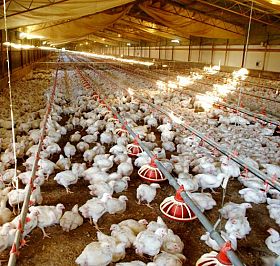 tor has been undertaking major expansion projects in broiler production by the three largest poultry companies in recent years.
tor has been undertaking major expansion projects in broiler production by the three largest poultry companies in recent years.Last year, Saudi Arabia’s broiler meat production was estimated at 600,000 MT, an increase of 13 per cent over production in 2011.
Total broiler production is projected to grow by seven per cent in 2014, to 640,000 MT, and forecast to further increase to 700,000 MT by 2015. Local broiler meat production currently covers about 42 per cent of poultry meat consumption needs, estimated at 1.44 million MT.
The Saudi government has been targeting the poultry sector to help achieve the Kingdom’s food security strategy goals, through offering local poultry producers with different types of production supports that include subsidies for animal feed, interest-free loans and rebates on the purchase of poultry equipment.
Despite the various types of incentives, Saudi poultry production still falls far short from a previously declared government’s goal of achieving full self-sufficiency in poultry meat consumption.
Soaring poultry feed costs as well as the high chicken mortality rates in Saudi poultry remain major constraints to expanding broiler production in the Kingdom.
Endemic poultry diseases have increased chicken mortality rates in many Saudi poultry farms in recent years, which have been estimated at 25 per cent, on average, and reached 50 per cent in some individual farms.
To reduce the risks associated with high mortality rates and encourage local investors, the Saudi Agricultural Development Fund (ADF) is considering the implementation of a new cooperative plan to subsidize insurance for poultry production.
The stated goals of this national scheme include establishing stricter bio-security programs for participating poultry farms, reducing average chicken mortality rate in the Saudi farms from 25 per cent to 5 per cent, and encouraging new investments in the poultry sector by compensating farmers for the financial loses they may suffer in the case of poultry diseases outbreaks.
Saudi broiler meat consumption is currently estimated at 1.44 million MT in 2013, but it is expected to slightly decline in 2014, to 1.38 million MT.
The small decline in consumption in 2014 is attributed to a lower number of Umrah and Hajj pilgrims expected to visit Saudi Arabia this year, as a result of the government’s efforts to manage the risks associated with the MERS Corona virus and the concerns over the Ebola virus outbreak in West Africa this year.
In 2013, Saudi Arabia was the world’s largest importer of broiler meat, with a total of 875,259 MT and an increase of 10 per cent over imports in 2012. Broiler imports in 2014, however, are forecast to decline to 790,000 MT.
This decline is mostly attributed the rise in local production last year and a lower demand by food catering services this year.
In 2013, Brazilian exports accounted for about 79 per cent of the Saudi poultry meat import market, followed by exports from France with 18 per cent market share, and the U.S. a distant-third with 3 per cent.
Saudi broiler meat exports to the GCC countries (UAE, Qatar, Bahrain, Oman and Kuwait) have been rising in the last few years. In 2013, Saudi Arabia exported about 35,000 MT of fresh and chilled broiler meat to the GCC countries.
Exports are projected to further rise to 50,000 MT in 2014, with increased demand from these countries for the perceived high quality of the Saudi products.
Saudi poultry exporters are required to reimburse to the Saudi government for the various production subsidies received by the Saudi producers, estimated at about $533 per MT.





